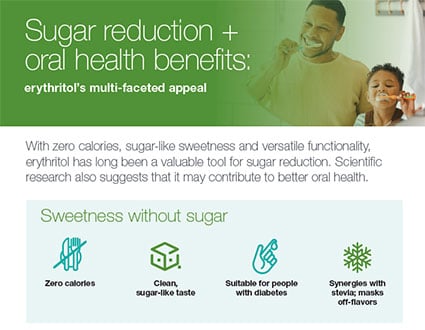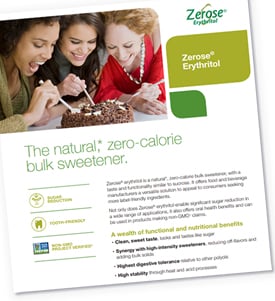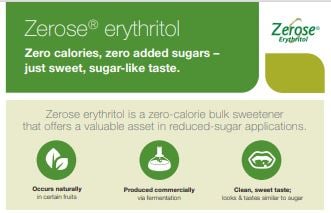Zerose® Erythritol Sweetener
 Zerose® erythritol is a natural*, zero-calorie bulk sweetener that looks and tastes like sugar, making it ideal for food and beverage applications promoting sugar reduction and weight management. Erythritol has the highest digestive tolerance compared to other polyols and masks the aftertaste of intense sweeteners. It is also non-cariogenic and has been clinically shown to offer Better Tooth Protection™ than other polyols.
Zerose® erythritol is a natural*, zero-calorie bulk sweetener that looks and tastes like sugar, making it ideal for food and beverage applications promoting sugar reduction and weight management. Erythritol has the highest digestive tolerance compared to other polyols and masks the aftertaste of intense sweeteners. It is also non-cariogenic and has been clinically shown to offer Better Tooth Protection™ than other polyols.

For a Healthier Lifestyle
Consumers embrace wellness mindset
 With the growing demands to reduce overall sugar consumption, the food industry is seeking ways to respond to consumer demand for foods that help meet their dietary and weight loss goals. This means developing foods that are sugar-free, lower calorie and low in glycemic carbohydrates while also achieving the desired texture, flavor and stability of traditional products.
With the growing demands to reduce overall sugar consumption, the food industry is seeking ways to respond to consumer demand for foods that help meet their dietary and weight loss goals. This means developing foods that are sugar-free, lower calorie and low in glycemic carbohydrates while also achieving the desired texture, flavor and stability of traditional products.
Applications: Carbonated soft drinks; Dairy and soy drinks; Energy drinks; Frozen beverages; Functional and flavored water; Juice; Powdered beverages; RTD Coffee; RTD Tea; Smoothies; Sports Drinks
Benefits:
- Clean, sugar-like taste
- Works well with high intensity sweeteners
- Enhanced body and mouthfeel
- Optimal freezing point depression
- Excellent heat and acidity characteristics
- Does not raise blood glucose or insulin levels
Functionality Benefits
- Acid resistance
- High glass transition temp
- High heat resistance
- High crystallization speed
- Low hygroscopicity
- Satisfying mouthfeel
- Viscosity control
Zerose® Erythritol Technical Details
Production ProcessErythritol is the first polyol to be industrially manufactured by a fermentation process. The starting material is a simple sugar-rich substrate that is fermented using conventional yeast to yield erythritol. The product is then crystalized to 99.5% purity from the filtered and concentrated fermentation broth. |

|
Molecular StructureZerose® erythritol is a low molecular weight polyol, comprised of four carbon atoms. It appears as a white crystalline, odorless product that rapidly dissolves in water (up to 60 g/100 ml at 30°C) to produce a brilliantly clear, low viscosity, colorless solution. |

|
|

Over the past several decades, studies have found that erythritol does not contribute to tooth decay – and can offer distinct oral health benefits. Our infographic highlights key points.
Download
In foods and beverages, erythritol can be a valuable tool for reducing sugar and calories.
Established research has also shown that it offers several mechanisms for improving oral care.
Download
Zerose® erythritol is an increasingly popular choice for reducing sugar in foods and beverages. It also lends the label-friendly appeal of sustainable sourcing and naturally occurring sweetness. Our report offers insight into consumer perceptions around sweeteners, the impact of label claims and how to select the right sweetener for your application.
Download
The natural,* zero-calorie bulk sweetener that offers food and beverage manufacturers a versatile solution to appeal to consumers seeking more label-friendly ingredients.
Download
For more than 30 years, erythritol has proven to be a valuable tool in sugar reduction. Learn more about this sweet-tasting, zero-calorie, versatile ingredient in our infographic.
DownloadWhat is Erythritol
Cargill Ingredient Stories presents What is Erythritol and what the ingredient can be used in. (00:45)
FDA defines reduction as 25% or greater.
*FDA has not defined natural. Contact Cargill for source and processing information. The labeling, substantiation, and decision making of all claims for your products is your responsibility. We recommend you consult regulatory and legal advisors familiar with all applicable laws, rules and regulations prior to making labeling and claims decisions, including decisions regarding natural claims.
Some Cargill products are only approved for use in certain geographies, end uses, and/or at certain usage levels. It is the customer's responsibility to determine, for a particular geography, that (i) the Cargill product, its use and usage levels, (ii) the customer's product and its use, and (iii) any claims made about the customer's product, all comply with applicable laws and regulations.



